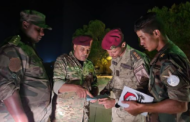Apr. 5, LNA General Command holds first ever officers meeting at its HQ in Al-Rajmah.
Apr. 6, Greek PM Mitsotakis meets Al-Dabaiba, calls to nullify “illegal” 2019 maritime boundaries agreement with Turkey.
Apr. 6, Italy PM Draghi meets Al-Dabaiba, wishes to contribute to Libya’s reconstruction.
Apr. 10, UNSG Guterres asks UNSC to approve sending 60 monitors to Sirte.
TRIPOLI
- Apr. 8, one migrant was killed and two were injured after a shooting took place in a detention center in Tripoli, Médecins Sans Frontières (MSF) reported. The two injured, aged 17 and 18, were transferred for urgent medical care by an MSF-team.
AL-RAJMA
- Apr. 5, the General Command of the Libyan National Army (LNA) held its first meeting at its headquarters in Al-Rajmah. The meeting of LNA officers was held under the slogan “The Armed Forces are the First Line of Defence for Libya and its People”.
MELLITAH-ZUWARA
- Apr. 6, an armed group forcibly closed the entrances and exits of the Mellitah Oil Industrial Complex in western Libya, near Tripoli. The blockade lasted several days. The syndicate of the complex condemned the closing and called on the Government of National Unity (GNU) to take the necessary measures to protect workers and end the armed sit-in. The syndicate pointed out that the armed group was affiliated with the city of Zuwara and acted following the kidnapping (or arrest, according to different sources) of the Zuwara security apparatus commander, Brig. Gen. Masoud Abaza;
- Apr. 6, the Security Directorate of Zuwara announced that its Director, Brigadier General Emad Al-Din Masoud Abaza was kidnapped at dawn. In a brief statement, the directorate said that Abaza was kidnapped on his way to perform the Fajr prayers.
MURZUQ
- Apr. 8, Head of the Libyan Presidential Council Mohamed al-Menfi, met with a delegation of notables from the city of Murzuq. The meeting discussed the difficult situation in the city, and the poor living conditions of its residents. During the meeting, Al-Menfi also discussed the security dangers threatening the region, near the porous southern border.
SIRTE
- Apr. 10, UNSG Guterres sent the UNSC a letter proposing the speedy approval of sending 60 monitoring personnel to Sirte. He added that the size of this team can be increased according to the requirements of the general security conditions in Libya.
TAWERGHA
- Apr. 6, the General Electricity Company of Libya (GECOL) reported that bad weather conditions and extreme wind speeds led to four power transmission towers in Tawergha to collapse, causing a blackout across the city.
ZINTAN
- Apr. 11, Marshal Khalifa Haftar held a meeting in Benghazi with a tribal delegation from the city of Zintan, who commended the great role played by residents of Zintan in support for the LNA. He also reviewed efforts made by the armed forces in coordination with security services, to maintain security in areas under its control.
INTERNATIONAL RELATIONS
- Apr. 11, Head of the Foreign Affairs Committee of the Libyan Parliament, Yousef Al-Agouri held talks with the Head of the Greek community in Benghazi, to discuss reopening the Consulate, and strengthening relations and cooperation between the two countries;

- Apr. 10, Egyptian President El-Sisi received his Tunisian counterpart Saied, to discuss a number of regional files, especially with regard to the situation in Libya. They agreed on the need to intensify joint coordination on the Libyan file, given that Egypt and Tunisia share direct borders with Libya;
- Apr. 8, the EU said Libya had entered a new political phase calling for transparency and accountability. The EU added that it supports this process by training the Libyan authorities on combating corruption and money laundering. The training focused on investigating and prosecuting corruption cases, in addition to the skills required to track down, seize, and confiscate assets related to high-profile corruption cases;
- Apr. 10, Italian Foreign Minister Luigi Di Maio said Libya needs the support of Italian companies for its reconstruction efforts, primarily through investments. This is especially necessary after the formation of the new Libyan government headed by Abdelhamid al-Dabaiba;
- the Syrian Observatory for Human Rights (SOHR) reported that Turkey had sent a new batch of some 380 Syrian mercenaries to Libya Apr. 8, adding that the group had been transported to Libya via Turkey;
- Apr. 8, Italian Defense Minister; Lorenzo Guerini said that the ceasefire in Libya remains “fragile”, despite the significant progress made in the political process and the formation of the new Government of National Unity (GNU) in UN-led talks in Geneva;
- Apr. 8, Abu Dhabi Crown Prince Sheikh Mohamed bin Zayed received PM Al-Dabaiba, who briefed Bin Zayed on the efforts of the transitional government to restore security and stability in the country, as well as efforts to drive the development and reconstruction process, and prepare for the December elections;
- Apr. 7, Tunisian President, Kais Saied received the Minister of Foreign Affairs of the Libyan Government of National Unity (GNU), Najla al-Mangoush. They discussed bilateral relations, and the distinguished partnership between Tunisia and Libya, as well as the prospects for their development and diversification;
- Apr. 7, the Emir of Kuwait, Sheikh Nawaf Al-Ahmad Al-Jaber Al-Sabah received the Prime Minister of the Libyan Government of National Unity (GNU), Abdel-Hamid al-Dabaiba and his accompanying delegation at the Al-Bayan Palace;
- Apr. 7, the second batch of about 400,000 doses of the COVID-19 vaccine arrived in Libya;
- Apr. 6, President of the European Council, Charles Michel called on Turkish President Recep Tayyip Erdogan to remove all Turkish-backed foreign fighters from Libya. In a joint press conference with the Turkish President, Michel said: “The de-escalation should be strengthened on the exit of foreign forces from Libya”;
- Apr. 6, Greek PM Mitsotakis called on Libya to nullify the “illegal” 2019 maritime boundaries agreement signed with Turkey, during his visit to Tripoli on Tuesday. In a joint press briefing with Libyan Prime Minister Al-Dabaiba, Mitsotakis said that “the annulment of illegal documents was very important for Greece,” and that he wished to cooperate with Libya on demarcating maritime borders in a way that “protects the rights of each country”;

- Apr. 6, on the sidelines of Italy’s PM Draghi’s visit to Libya, the Italian-Libyan Chamber of Commerce confirmed that the return of Italian companies to Libya was important for the development of the two countries;
- Apr. 6, Italian prime minister Mario Draghi met his Libyan counterpart Al-Dabaiba in Tripoli, wishing to contribute to Libya’s reconstruction during a joint press conference. This was Draghi’s first visit to Libya and his first overseas trip since taking over office in February. Aldabaiba affirmed Libya’s interest in strengthening strategic cooperation with Italy adding that Italy is one of the few countries whose embassy continued to operate from inside Tripoli through Libya’s troubles.



























